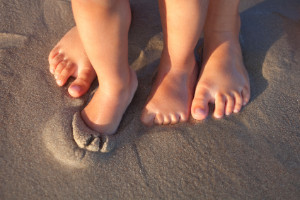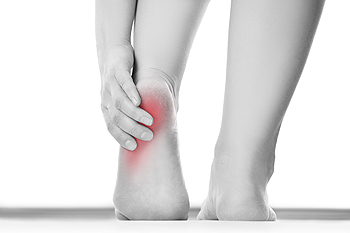
 While buying shoes for children can be tough, it is important. Children’s feet are still developing and growing, and their shoes have to reflect this. It’s a good idea to measure a child’s foot before buying shoes. When they try on the shoe, check to see if they can wiggle their toes around. If they can’t, look for shoes that are either longer or wider. Even after buying a pair of shoes, it is recommended to keep measuring them every few months to see if they still fit. Children’s feet grow quickly, and their shoes can be subject to more wear than those of adults. Consequently, replacing shoes every few months may not be uncommon.
While buying shoes for children can be tough, it is important. Children’s feet are still developing and growing, and their shoes have to reflect this. It’s a good idea to measure a child’s foot before buying shoes. When they try on the shoe, check to see if they can wiggle their toes around. If they can’t, look for shoes that are either longer or wider. Even after buying a pair of shoes, it is recommended to keep measuring them every few months to see if they still fit. Children’s feet grow quickly, and their shoes can be subject to more wear than those of adults. Consequently, replacing shoes every few months may not be uncommon.
Making sure that your children maintain good foot health is very important as they grow. If you have any questions, contact Dr. Russell J. Ellicott of Augusta Foot Center. Dr. Ellicott can provide the care you need to keep you pain-free and on your feet.
Keeping Children's Feet Healthy
Having healthy feet during childhood can help prevent medical problems later in life, namely in the back and legs. As children grow, their feet require different types of care. Here are some things to consider...
Although babies do not walk yet, it is still very important to take care of their feet.
Avoid putting tight shoes or socks on his or her feet.
Allow the baby to stretch and kick his or her feet to feel comfortable.
As a toddler, kids are now on the move and begin to develop differently. At this age, toddlers are getting a feel for walking, so don’t be alarmed if your toddler is unsteady or ‘walks funny’.
As your child gets older, it is important to teach them how to take care of their feet.
Show them proper hygiene to prevent infections such as fungus.
Be watchful for any pain or injury.
Have all injuries checked by a doctor as soon as possible.
Comfortable, protective shoes should always be worn, especially at play.
If you have any questions please feel free to contact our office located in Augusta, GA. We offer the newest diagnostic and treatment technologies for all your foot and ankle needs.
Read more about What to Do to Keep Your Child’s Feet Healthy Do your heels hurt after the end of the day? You may be suffering from plantar fasciitis, heel pain that is caused by stress on the tissues in the heel. If so, you are not alone. Plenty of people report that they suffer from heel pain on a daily basis. Many times this is caused by improper footwear that offers little-to-no support. Most podiatrists recommend good quality footwear with custom made arch support to help relieve plantar fasciitis. It is important though to see a podiatrist who can check if you are suffering from plantar fasciitis. They can then offer personalized advice and treatment for your heel pain.
Do your heels hurt after the end of the day? You may be suffering from plantar fasciitis, heel pain that is caused by stress on the tissues in the heel. If so, you are not alone. Plenty of people report that they suffer from heel pain on a daily basis. Many times this is caused by improper footwear that offers little-to-no support. Most podiatrists recommend good quality footwear with custom made arch support to help relieve plantar fasciitis. It is important though to see a podiatrist who can check if you are suffering from plantar fasciitis. They can then offer personalized advice and treatment for your heel pain.
Plantar fasciitis can be very painful and inconvenient. If you are experiencing heel pain or symptoms of plantar fasciitis, contact Dr. Russell J. Ellicott from Augusta Foot Center. Dr. Ellicott can provide the care you need to keep you pain-free and on your feet.
What is Plantar Fasciitis?
Plantar fasciitis is the inflammation of the thick band of tissue that runs along the bottom of your foot, known as the plantar fascia, and causes mild to severe heel pain.
What Causes Plantar Fasciitis?
How Can It Be Treated?
While very treatable, plantar fasciitis is definitely not something that should be ignored. Especially in severe cases, speaking to your doctor right away is highly recommended to avoid complications and severe heel pain. Your podiatrist can work with you to provide the appropriate treatment options tailored to your condition.
If you have any questions please feel free to contact our office located in Augusta, GA. We offer the newest diagnostic and treatment technologies for all your foot and ankle needs.
Read more about Plantar Fasciitis Gout is an inflammatory condition that forms as a result of excess uric acid in the blood. Studies have shown that drinks that are high in sugar have resulted in a heightened risk of gout in men. Approximately 1 in 14 men and 1 in 35 women have the condition, and the big toe is the most common joint to be affected by it. Experts believe that cases of gout have risen in the past twenty years because more people are drinking soda and other sugary drinks than ever before. If you are worried about developing gout try to avoid things like seafood, which is typically high in purines.
Gout is an inflammatory condition that forms as a result of excess uric acid in the blood. Studies have shown that drinks that are high in sugar have resulted in a heightened risk of gout in men. Approximately 1 in 14 men and 1 in 35 women have the condition, and the big toe is the most common joint to be affected by it. Experts believe that cases of gout have risen in the past twenty years because more people are drinking soda and other sugary drinks than ever before. If you are worried about developing gout try to avoid things like seafood, which is typically high in purines.
Gout is a foot condition that requires certain treatment and care. If you are seeking treatment, contact Dr. Russell J. Ellicott from Augusta Foot Center. Dr. Ellicott will treat your foot and ankle needs.
What is Gout?
Gout is a type of arthritis caused by a buildup of uric acid in the bloodstream. It often develops in the foot, especially the big toe area, although it can manifest in other parts of the body as well. Gout can make walking and standing very painful and is especially common in diabetics and the obese.
People typically get gout because of a poor diet. Genetic predisposition is also a factor. The children of parents who have had gout frequently have a chance of developing it themselves.
Gout can easily be identified by redness and inflammation of the big toe and the surrounding areas of the foot. Other symptoms include extreme fatigue, joint pain, and running high fevers. Sometimes corticosteroid drugs can be prescribed to treat gout, but the best way to combat this disease is to get more exercise and eat a better diet.
If you have any questions please feel free to contact our office located in Augusta, GA. We offer the newest diagnostic and treatment technologies for all your foot and ankle needs.
Read more about Everything You Need to Know About Gout It is common for pregnant women to experience changes in their feet throughout their pregnancy. Pregnant women may notice that their feet will become swollen, and their arches may become flatter. If you are dealing with swollen feet, you may be wondering what can be done to help the swelling go down. Compression stockings can be worn to reduce swelling, along with regular exercise. Furthermore, it is important for pregnant women to stay hydrated in order to reduce discomfort in the foot and ankle. It is also helpful to avoid standing for long periods of time and to try propping your feet up while sitting in order to avoid getting swollen ankles.
It is common for pregnant women to experience changes in their feet throughout their pregnancy. Pregnant women may notice that their feet will become swollen, and their arches may become flatter. If you are dealing with swollen feet, you may be wondering what can be done to help the swelling go down. Compression stockings can be worn to reduce swelling, along with regular exercise. Furthermore, it is important for pregnant women to stay hydrated in order to reduce discomfort in the foot and ankle. It is also helpful to avoid standing for long periods of time and to try propping your feet up while sitting in order to avoid getting swollen ankles.
Pregnant women with swollen feet can be treated with a variety of different methods that are readily available. For more information about other cures for swollen feet during pregnancy, consult with Dr. Russell J. Ellicott from Augusta Foot Center. Dr. Ellicott will attend to all of your foot and ankle needs.
What foot problems can arise during pregnancy?
One problem that can occur is overpronation, which occurs when the arch of the foot flattens and tends to roll inward. This can cause pain and discomfort in your heels while you’re walking or even just standing up, trying to support your baby.
Another problem is edema, or swelling in the extremities. This often affects the feet during pregnancy, but tends to occur in the later stages.
How can I keep my feet healthy during pregnancy?
If you have any questions please feel free to contact our office located in Augusta, GA. We offer the newest diagnostic and treatment technologies for all your foot and ankle needs.
Read more about Pregnancy and Foot Health